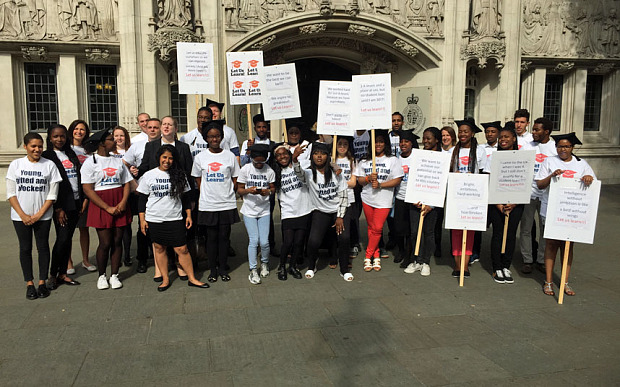Today is the 25th anniversary of the UN Universal Children's Day and Lecturer in Law, Devyani Prabhat, discusses how a University of Bristol Law School Citizenship Project is keeping children central in the legal analysis.
The Law School Citizenship Project is funded by a three year ESRC grant. It currently examines the various meanings and content of British citizenship and has highlighted how citizenship and related issues secure legal statuses act as gateways. This has particular resonance for children and young people who identify themselves as British but are still excluded from full participation in British society.
For example the regulations for educational loans exclude many such children from higher education in the UK. Without higher education many young people are ill-equipped to contribute to their own futures and to society.
According to the regulations the loans can be secured only when a student has been lawfully ordinarily resident in the UK for three years before the day the academic year begins (“the lawful residence criterion”); and has been settled in the UK on that day (“the settlement criterion”).
The settlement requirement did not apply, however to citizens of the European Economic Area (EEA) residing in the UK, those with refugee and humanitarian status, and British citizens. Thus without a secure legal status, such as British or EEA citizenship, many children are unable to attend university as they cannot obtain loans for paying university fees.
Inability to access higher education infringes on the right to education of young people under Article 2, Protocol 1 of the European Convention of Human Rights. This view has recently been affirmed by the UK Supreme Court in a powerful judgment upholding the right of all children to access higher education free of discrimination in the UK.
This case, the Tigere case, R (on the application of Tigere) v Secretary of State for Business, Innovation and Skills [2015] UKSC 57, is about university admissions. Since the educational loan regulations require a settled status all students with limited or discretionary leave to remain in the UK are ineligible for student loans.
Tigere is a 20 year old Zambian national, who came to the UK in 2001 aged six. Clearly in terms of identity, Tigere is British, but her legal status is not that straightforward. Her mother was an over stayer , so at one point in her life Tigere was unlawfully present in the country. Later she obtained discretionary leave to remain in the UK and in 2018 she will be able to apply for indefinite leave to remain.
Tigere was offered several university places but was unable to accept the places as she was not eligible for a student loan because of her immigration status. Before the Supreme Court Tigere challenged the lawful residence criterion and the settlement criterion in terms of the right to education and also of discrimination in enjoyment of that right.
The Supreme Court allowed Tigere’s appeal by a majority of 3:2. The lead judgment is written by Lady Hale and she finds the settlement requirement for loans violates Tigere’s right to access education. Writing about the impact on the lives of young people she says:
One does not need to have been a university teacher to appreciate that it is important to keep up the momentum of one's studies, to maintain the habits and skills learned at A level, and in many cases (particularly the sciences) to retain the knowledge gained there. A voluntary gap year is one thing, but an enforced gap of several years is quite different. These young people will also find it hard to understand why they are allowed access to all the public services, including cash welfare benefits, but are denied access to this one benefit, which is a repayable.
While the Tigere judgment is a major victory for children’s rights, it still falls short of fully endorsing the importance of children’s rights. It fails to emphasize the importance of a ‘best interest of child’ assessment which would consider the welfare of a child broadly, including access to education.
Not once does the judgment develop upon this principle in terms of right to education of children. Further, since Tigere, there has been no major changes yet in the legislative and regulatory frameworks but for some interim arrangements introduced for students to access loans so long as they have three years of lawful leave in the UK.
This 20th November, the 25th anniversary of the UN Universal Children's Day, is therefore an apt opportunity to remind all public bodies concerned with decisions that affect children that the best interest of the child has to be placed at the heart of analysis of children’s rights. After all, access to education remains a key objective for the UN. According to the UN Secretary-General Ban Ki-moon,
The one thing all children have in common is their rights. Every child has the right to survive and thrive, to be educated, to be free from violence and abuse, to participate and to be heard.
Therefore, member states should make all efforts to keep children central in legal analysis and decision making especially where the highest court of the land has found gaps to exist in law which have adverse consequences on the lives of young people.
On December 4th, the Bristol Law School and the Project for the Registration of Children as British Citizens (PRCBC) are holding a workshop in London with key stakeholders involved in registration of children as British citizens.
